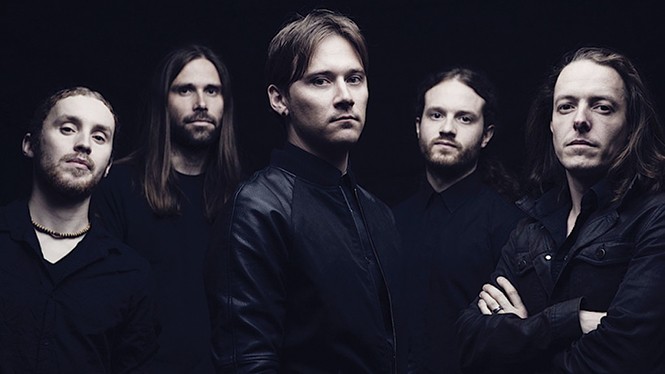Is Djent a Djenre?
TesseracT, Periphery and other bands dwell within a contentious genre.
By Doug BrianOn April 20, 2010, Washington, D.C., sextet Periphery released their self-titled debut album. The release went over even the most loyal metal fans' heads, but marked the beginning of a controversial scene in heavy metal music: djent
Djent is a spinoff of progressive metal that revolves around a very specific guitar sound achieved through palm-muting techniques and specific settings on amplifiers and effects units. The word "djent" itself is onomatopoeia for the sound. Besides the guitar sound, chugging offbeat melodies and polyrhythms would become its other defining characteristics.
While Periphery was the first djent album released on a mainstream record label (Sumerian/Distort, via Roadrunner), djent had in fact existed for several years before its inception. The earliest days of the style were its development in the sounds of bands such as Meshuggah and SikTh, both prominent progressive metal bands.
The scene around djent, however, had a very different origin that sprung from an online community of guitarists recording at home. Englishmen Paul Ortiz and Alec "Acle" Kahney, and Americans Misha Mansoor and Tosin Abasi were parts of this community; they would share their compositions among and work off of each other. It was from this web that the pioneers of djent would emerge. As Kahney continued to make music, he sought out other musicians and formed TesseracT. Mansoor formed Periphery, and Tosin Abasi would form Animals as Leaders. Ortiz would continue to work solo as Chimp Spanner. Today, these four bands are considered the vanguard of the movement.
Why exactly, then, is djent so polarizing even five years after its beginnings? Certainly, these bands have a respectable following and are carrying on the tradition of pushing the envelope, which they can only be appreciated for; why is djent such a hot-button issue in heavy metal? The answer is the fight over whether or not djent is. From the beginning, people have questioned whether djent is an actual genre of music, or an example of an over-categorized fad.
On one hand, it would be easy to consider djent a genre or subgenre. It has a set beginning era, bands that define it, specific characteristics that make it what it is, and a rather die-hard fanbase. Many listeners would say that there is an indisputable difference between regular progressive metal and djent, that djent's heavy syncopation, low pitch, and technical complexities set it apart from any other kind of metal. And there's no doubt that the artists involved have received considerable acclaim for their music.
However, simultaneously, many other listeners claim that djent is nothing more than another progressive metal scene, and has no validity as a separate genre. Musicians such as Lamb of God's Randy Blythe and Rosetta's Mike Armine have condemned the classification of music as djent. Even Misha Mansoor believes that djent isn't a genre as much as a specific sound. He explained that, in the beginnings of Periphery, he was looking for "djenty equipment" that could be used to create the sounds that Mansoor desired. In an interview with Guitar Messenger, he explained, "For some reason, it caught on, but completely in the wrong way because people think it's a style of music I play."
Whether djent began as a genre of any sort is irrelevant; over the last decade, such a definitive sound has been built around the term, a definitive style and fanbase. While it may not be accurate to call it a genre, djent is absolutely a movement. For having existed for such a short time, it has made its impact on the progressive metal scene; in the future, given more time and more artists breaking out into the mainstream, it could develop into a legitimate genre. Periphery's first release marked its beginning, TesseracT's Altered State solidified it, Meshuggah's thrashing madness gave it ground. If nothing else, djent can be called a new step in musical experimentation, which, although the source of a passionate dichotomy, is also the source of innovative music and a new age in heavy metal.
More by Doug Brian
-
Live: Music Picks Mar. 3-9
Johnny Love, Vince Staples, The Rev. Horton Heat and more
- Mar 2, 2016
-
Live: Music Picks Feb.18-24
The Budos Band, Galactic, STRFKR and more
- Feb 17, 2016
-
Pop Puck
Chicago's Knuckle Puck and pop punk mature together.
- Feb 10, 2016
- More »
Latest in Music
Readers also liked…
-
The Alpines Head North
Local band's debut concept album finds musical bliss in the apocalypse.
- Feb 7, 2024



